The Ashes of Burnout: Exploring Growth in The Royal Tenenbaums
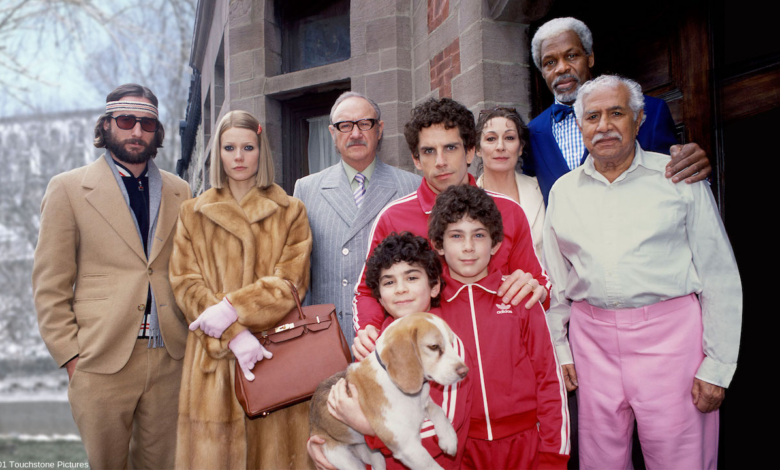
Molly Kurpis ‘24 / Emertainment Monthly Co-President
Your coked-out neighbor has just crashed his car in the side of the Church. It is the wedding day of your mother and her business manager. You aren’t sure if she is getting married for love, for tax benefits, or to spite her ex-husband, your father. Your family still hasn’t forgiven him for his elaborate lie about stomach cancer. He just wanted to reconnect with his family; the estranged, emotionally distant pieces of his family. Your family gathers at home, a beautiful mansion in Harlem, Manhattan. Being at home forces you to return to the remains of your childhood. The success that preceded you, before you even fully became a person. Those expectations are sketched everywhere on your bedroom walls and still exist in your father’s gaze as he wonders what went wrong during all those years. But he’ll never know; and you might not know, either.
Your coked-out neighbor runs over your brother’s dog. It was an accident. Your nephews were in the car’s path, but your father, by the sheer, divine forces of a miracle, pushed them from the car’s teaming engine. They survive, but their dog does not. Your father ends up buying a Dalmatian from the firemen who were called to remove the car from the Church’s walls. He offers the dog as a peace treaty to your brother, who says in return, “I’ve had a rough year, Dad.”
The Royal Tenenbaums, written by Wes Anderson and Owen Wilson (who also plays the coked-out neighbor Eli Cash), takes an introspective look at the possibility of growth during an age when most people are expected to have “settled down.” The ability to change is not restricted to just adolescence and adulthood. Change can be necessary for three, middle-aged siblings who are holding onto their strings of the past; who have convinced themselves that the best parts of their lives have already happened. How, then, does one keep going after believing that you have reached all of your potential? The Royal Tenenbaums explores these complications, coming to terms with a once extraordinary life that has turned invisibly ordinary. Anderson examines three distinct lives that seem to plateau, or even diminish, after reaching adulthood: Chas Tenenbaum (Ben Stiller), Margot Tenenbaum (Gwyneth Paltrow), and Richie Tenenbaum (Luke Wilson). Their reunion at their old childhood home in Harlem forces them to realize their stagnant ways of living, and that the only way to successfully carry on is to change. How these characters decide to change, however, is nuanced, complicated, and oftentimes dark. Anderson, a masterful storyteller, accomplishes these decisions through his autonomous characters, his signature tonal choices, and his intricate balance of dialogue and exposition.
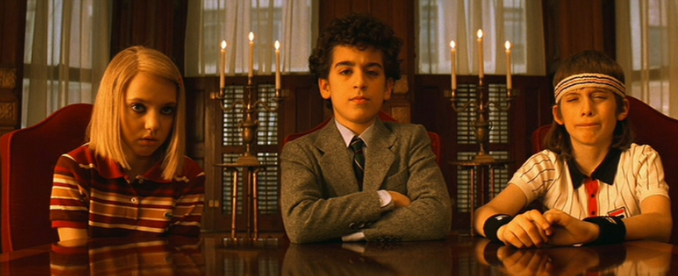
A playwright, a business entrepreneur, and a professional tennis player. Ninth grade, sixth grade, eleventh grade — the ages where Margot, Chas, and Richie each peaked in their respective fields. The first act of The Royal Tenenbaums features an excellent beginning montage that combines direct and indirect characterization. The Narrator (voiced by Alec Baldwin), breaks all the conventions a film is supposed to respect. The opening is so saturated with information that most creative writing classes would chastise such an opening as being too literal, too easy, and not having the audience work for anything. The siblings are directly characterized in a brief montage sequence. Chas bred Dalmatian mice when he was in the sixth grade. He sold his work to a pet shop in Tokyo. With the money he made, Chas invested in real estate and opened his own bank account, giving himself complete financial autonomy. Margot was adopted when she was two. She wrote a play in the ninth grade that won a prestigious grant for fifty thousand dollars. Richie became a professional tennis player in the third grade. He turned pro at seventeen and won the US Nationals three times in a row. Already, the three Tenenbaums have hit major accomplishments very early in their lives. They are defined solely by their achievements. Any suggestions of having a “normal childhood” are lost to financial, artistic, and athletic accomplishments.
Each sibling is vastly different in personality, but their personalities are only understood through what they have achieved as children. The weight of what the world expects of them now, decades later, is explored within the rest of the film.
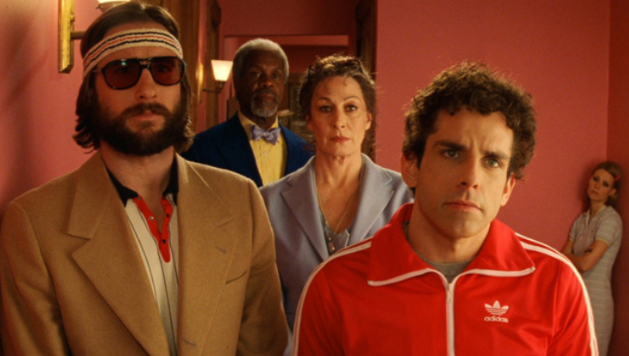
Prior to Royal’s (Gene Hackman) cancer scheme, each sibling is living their own, independent life. Chas lives with his two sons in a modern, well-kept apartment in Manhattan. After losing his wife in a plane crash, he becomes obsessed with drills. He forces his sons, Ari and Uzi (Grant Rosenmeyer and Jonah Meyerson), to complete different emergency drills to make sure they can get out of the house alive. When they don’t make his expected time, Chas convinces himself the apartment needs better alarms and decides to live with his mother, Etheline Tenenbaum (Anjelica Huston), until the apartment is better suited for emergencies. Etheline visits Margot, who lives with Raleigh St. Clair (Bill Murray), a writer and neurologist. She has not completed a play in seven years. She spends most of her days in a bathtub watching television. Etheline comments on this, as well as Chas’ mental state. “He’s been very depressed,” Etheline tells Margot on the edge of the bathtub. “So am I,” Margot responds. Etheline tilts her head – “So are you what?” This propels Margot to move back home. Etheline also reaches out to Richie, who has been traveling alone on an ocean liner for the past year. He retired from professional tennis at the age of twenty-six, the age most tennis players hit their peak. His last match resulted in him having a mental breakdown on the court.
Here, Anderson shows the audience the burn-out of each character. The information is revealed through direct dialogue tags. Their inability to move on from their success weighs on the decisions they make and eventually becomes a key motivator for them to come home. Once they are home, however, they must deal with their belligerent father, who is desperate to establish meaningful relationships with his children. However, Royal is also motivated by Henry’s (Danny Glover) asking for Etheline’s hand in marriage. Like his children, perhaps Royal also has a difficult time moving on.
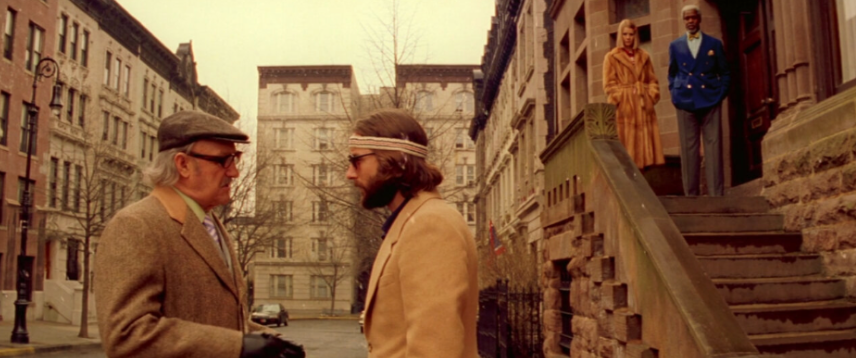
Wes Anderson’s signature nonchalant, forthright tone is woven intricately throughout the screenplay. Yet, contrastingly, these characters are deeply emotional, tired from their lack of ambition, and tired of wondering who they are still supposed to be. Having Anderson’s candid tone emphasizes what the characters are saying, and how they are saying it. One of the beauties of Anderson’s films is their heavy emphasis on the visuals; what is being shown on the screen versus what is purposely being omitted from the frame. The screenplay for The Royal Tenenbaums is saturated with italicized action lines, suggesting an emphasis more on movement, and less on conversation. This is visual storytelling at its greatest. After the Tenenbaum characters are reunited (under the same roof for the first time in seventeen years, the Narrator informs the audience), the story has been set up, and Anderson lets his characters interact with each other in clunky, awkward exchanges. Margot and Richie have a strange, romantic relationship that is complicated by their step-sibling situation, Margot’s marriage to Raleigh, and her previous relationship with Eli, Richie’s old best friend. Royal spends a great amount of effort trying to bond with Chas’ kids since he has never met them before, but Chas is reserved and cold, not wanting his children involved in Royal’s sometimes reckless schemes. However, Royal is stubborn and eventually sneaks Ari and Uzi out of the house.
The middle part of the film is complicated by the characters’ relationships, and how they are expected to act with one another. Because the movie is character-driven, there is no end goal or presumed objective the characters must hit. Instead, the burnout of each sibling is developed through their hazy, uninterested attitude toward life. None of the Tenenbaums are passionately driven by the things they once succeeded in. Royal makes a passing comment to Margot about how she used to be a genius. She scoffs, “No, I didn’t.” This sense of burnout is explored through their lack of passion and motivation to make any meaning in their lives. They already made their meaning. It’s unclear what is expected to happen next. Relationships are unattainable, lacklust, and straining. The only relationship that hints at passion is Richie and Margot. Raleigh, who is worried about Margot’s lack of commitment, sends a private investigator to look into Margot’s private life. Through a purely visual montage, each of Margot’s elaborate relationships are revealed, including her one with Eli. Richie is stunned, deeply hurt, and attempts suicide as a result. This final push brings Richie’s burnout to light. While Chas and Margot are more reserved in character, Richie’s emotional reaction to Margot’s affairs ensures that the audience understands the ramifications that stem from the pressures in his life as a whole. Richie has no prospects. He is a washed-up, irrelevant tennis player who ended his career in tears and a mental breakdown. He has no wife, no children, no lifelong goals. His one chance at a relationship is seemingly tarnished by his best friend. There is nothing left for him. It is a heartbreaking scene, and difficult to watch, but it captures the amalgamation of pressure, societal expectations, and the unknown of adulthood. It is the harrowing truth of being a prodigy and growing up to be next to nothing.
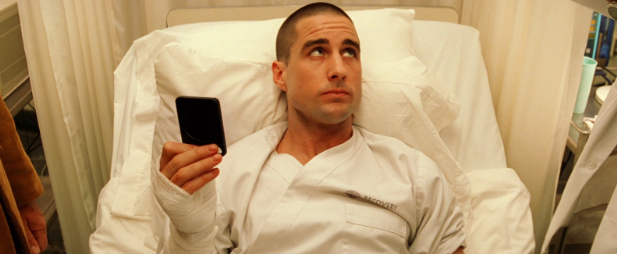
When, then, do the Tenenbaum siblings grow from the ashes of their burnout? Will they ever be able to truly escape the cycle of expectations, perpetuated by society and by themselves? By the end of the film, when Eli Cash, coked-out and manic, crashes into the side of the Church where Etheline and Henry were to be wed, the Tenenbaum siblings have changed in the slightest of ways. Margot and Richie confess their attraction to each other, though they recognize the societal view of step-siblings dating isn’t in their favor. Richie is hopefully receiving the treatment he needs, and Margot makes things right with Raleigh. Chas has his own emotional arc outside of the Church, once it is revealed that Royal pushed Ari and Uzi away from Eli’s car. Seen in the film as selfish and stubborn, this act of putting his life on the line touches Chas in ways that don’t ask for an apology or an acknowledgment for their turbulent relationships in the years past. Instead, Royal buys Chas and his boys a new dog, and all Chas can say is “I’ve had a rough year, Dad.”
The quiet, intricate moments of characterization, in conversation with Anderson’s direct stylistic and tonal decisions, make for a film so rich in complexity and human nature that one can’t help but feel the Tenenbaums are real people, searching the streets of New York with a new desire for purpose. Maybe there is a chance for them after all. Maybe the ashes of their burnout have the potential to blossom into something new, something different, something better.